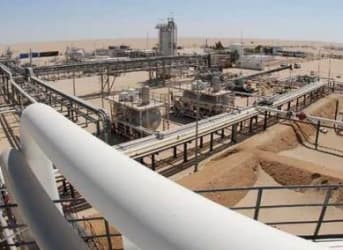One thing that keeps uniting the warring factions in the spilling-out-of-control civil war in Libya is crude oil revenues. Despite falling from a high of 1.7 mbd shortly before the toppling of Colonel Qadaffi, oil production hovers around 600,000 bpd today, which is still enough to pay for the subsidies and salaries of workers. Surprisingly, the National Oil Company (NOC), selling the crude abroad mostly to Italy, Spain and France, and the central bank, where the oil revenue is deposited, have been able to preserve their independence and continue to execute long-term oil contracts and transferring salaries and subsidies to all parts of the country. However, the General National Congress (GNC), the Islamist government controlling Tripoli and the west of the country, has been pressuring the NOC not to comply with orders by the internationally-recognized government in Beida.
The latter, headed by PM Abdullah al-Thinni is governing mostly from hotel buildings in the east having little control over what is going on in Tripoli. Most recently it has been trying to recoup control of the oil industry by ordering export payments to be deposited not at the central bank but at a separate account in the UAE, and by setting up an alternative national oil company (NOC) in Tobruk. This move is unlikely to be successful according to analysts as PM Thinni cannot claim authority on oil export contracts. According to Libyan watchers, it will be difficult to convince investors to strike new contracts with Beida as long as the current NOC in Tripoli continues to facilitate exports as planned. Related: Can Electric Vehicles Take The Private Transportation Crown?
In fact, recent reports show that calm has returned to the IOCs, who are ready to expand cooperation and trade with the NOC. Until the fall of Qaddafi, the latter used to have ambitious plans for revamping the brown fields in the eastern provinces by using enhanced-oil-recovery (EOR) techniques to boost production capacity by around 775,000 bpd. Investors are still betting on a positive resolution of the political chaos. This is not surprising considering Libya’s proven oil reserves, which are currently estimated at 48 billion barrels and thus are Africa’s largest, according to the US Energy Information Administration.
The alternative NOC operates four terminals in the east, including the largest loading facility at es Sider and the third largest, at Ras Lanuf. These two have been blocked for exports at least since mid-2013, first by the Petroleum Facilities Guard (PFG), hired to protect the facilities, and more recently by fierce fighting with Islamist groups in the region. Last week, Saif Al Mabrouk, Chairman of the eastern NOC, told media that his team will begin negotiations with oil traders to coordinate the export of oil from es Sider and Ras Lanuf. The two ports have a combined loading capacity of 560,000 bpd. According to Mr. Al Mabrouk, up to 2.5 million barrels will be ready to be loaded for exports in around one month following the completion of storage tanks repair and the recovery of power supply lines cut by the withdrawing Islamist fighters. Mr. Al Mabrouk also urged buyers to coordinate exports from the two Western ports (under GNC control) with the eastern NOC. Related: Has The Bakken Peaked?
In 2013, the country exported close to 900,000 bpd but the struggle for control over the oil industry has slashed exports by half since then. Creating competing oil institutions will not help the situation and in the end will hurt Prime Minister Al Thinni himself if the uncertainty pushes investors out of the country. Al Thinni is also finding it difficult to convince army generals, showing nominal loyalty to his government, not to strike side oil deals through unofficial channels. One of these generals, Ibrahim Jathran, who controls the four major ports in the east is believed to have illegally loaded petroleum products on tankers for exports. The international community has urged all companies trading with Libya not to conclude crude oil deals with unauthorized partners in attempt to stiffen the flow of cash to Islamist militants, including the new branch of the Islamic State (IS).
 Related:Has The U.S. Reached “Peak Oil” At Current Price Levels?
Related:Has The U.S. Reached “Peak Oil” At Current Price Levels?
For now it seems that two major rivals in the east and west benefit from the independent control of the central bank over the oil revenue. The central bank has been able to keep the economy afloat by redistributing the crude income to government workers, soldiers and even militias operating throughout the country. Yet the enormous budget and trade deficit estimated at more than 2/3 of GDP will soon dry up the country’s foreign reserves plunging the economy into a tailspin.
The IMF estimates that oil and gas sales accounted for 96% of all budget revenue in 2012. In 2014, the revenue from oil exports had declined six times to around USD 4 billion on the back of infrastructure sabotage and dwindling oil prices. For now IOCs have decided to give Libya the benefit of the doubt partially because most of the oil fields in the country had not been seriously affected. However, if the export bottlenecks are not removed decisively and the security situation does not improve, it will be difficult to justify their investment.
By Martin Vladimirov for Oilprice.com
ADVERTISEMENT
More Top Reads From Oilprice.com:
- OPEC Boosting Production To Keep Pressure On U.S. Shale
- Top 5 Richest Tycoons In Renewable Energy
- How Much Water Does The Energy Sector Use?


















